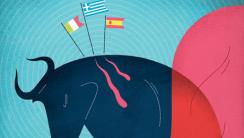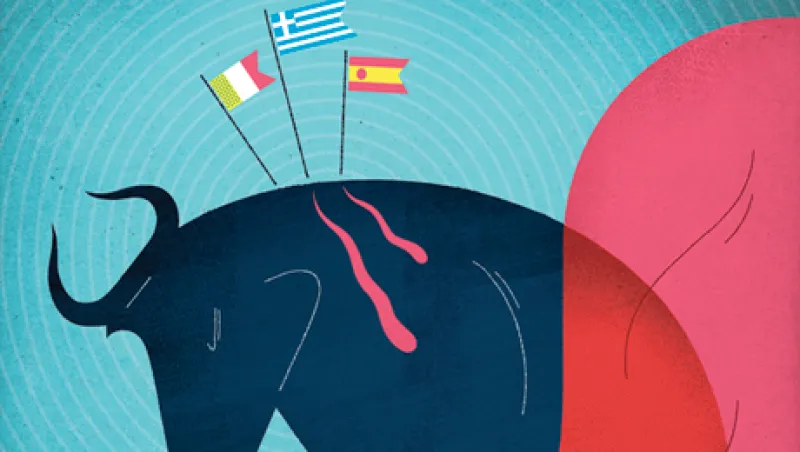
His face bruised and bloodied, Carlos Palma puffs up his chest and braces himself to face the gleaming black bull pawing the ground a few meters away in Lisbon’s ornate Campo Pequeno bullring. Seconds later the 1,200-pound beast charges, ramming Palma square in the chest and hurling him backward as he clings on between the bull’s leather-sheathed horns, a daring maneuver known as the pega, or catch. Then, Palma and his teammates on the forcados, an eight-man group sometimes called “the suicide squad,” surround the animal and subdue it, eschewing the fatal stab of a Spanish matador. This style of bullfighting is a distinctively Portuguese spectacle that relies on courage, teamwork and brute strength to overcome a seemingly unstoppable opponent.
Those are qualities the Portuguese people will need in abundance if the country is to surmount its daunting financial and economic crisis, which prompted the government to go to the European Union and the International Monetary Fund for a €78 billion ($116 billion) bailout in May. With a 2010 budget deficit of 9.1 percent of gross domestic product and a debt burden fast approaching 100 percent of GDP, Portugal’s finances are a mess, albeit not quite of Greek proportions. The country’s economic malaise runs far deeper, though. Portugal is the euro zone’s poorest member and has averaged annual growth of just 1 percent since 2000, the second-worst performance of any country in the group, after Italy. Traditional sectors like textiles and ceramics have crumbled in the face of competition from China and Eastern Europe. Corporate debt stands at 140 percent of GDP, one of the highest rates among euro zone countries, and Portugal’s banks are highly leveraged, operating with the zone’s highest loan-to-deposit ratio.
“It’s unthinkable that the Portuguese economy can survive if it continues with the structural deficiencies that we’ve seen over the past ten years,” says António Ramalho, chief financial officer at Millennium BCP, Portugal’s largest private bank.
To remedy those ills, Portugal, like Greece and Ireland before it, is putting on an IMF hair shirt. In exchange for the bailout funds, the government has agreed to adopt a painful, three-year austerity program of steep spending cuts, big tax increases and difficult structural reforms designed to reduce labor costs and foster productivity growth. Unlike Greece, where the conservative opposition has opposed similar budgetary medicine, Portugal enjoys a strong political consensus behind the measures. Although voters in June tossed out the Socialist government that negotiated the EU-IMF program, the new, center-right government of Prime Minister Pedro Passos Coelho has embraced the need for fiscal and economic reform.
“We cannot hide the scale and the urgency of the challenges ahead, yet we do not fear them either,” Passos Coelho told the nation in his inaugural speech to Parliament.
The prime minister has put together a youthful, technocratic government and moved quickly to implement the reform package. In its first three months in power, the government has imposed a stiff income tax hike on year-end bonuses, announced significant cuts in public sector payrolls and drafted plans to privatize a slew of government-owned industries. Later this year the government plans to cut social security contributions for business and hike the value-added tax. The measures aim to reduce the deficit to 3 percent of GDP by 2013 and enable Portugal to return to the capital markets for finance.
Last month, in their first review of the government’s performance, staff from the IMF, the European Commission and the European Central Bank praised Portugal for meeting the early targets of the austerity program but cautioned that the biggest test is yet to come. “Most of the difficult changes still lie ahead and the authorities’ resolve in this regard will undoubtedly be fiercely tested by opposition from vested interests,” they said in their report.
Many analysts and investors remain doubtful that the program will succeed. They fear that the austerity measures will deepen Portugal’s economic slump and make its debt burden unsustainable, forcing the government to seek more outside aid or write down part of the country’s debt. That’s no small risk. The EU-IMF program projects that the economy will contract this year and next and return to only modest growth of 1.2 percent in 2013. Moody’s Investors Service underscored the debt concerns in July when it cut Portugal’s credit rating by four notches, to Ba2 — a junk rating.
“It’s true that the situation of Portugal is different from that of Greece, but one year ago we thought that Greece would be able to go back to the market quite soon,” says Cinzia Alcidi, an economist at the Centre for European Policy Studies in Brussels. “For Greece it clearly didn’t work, and it’s unlikely to work for Portugal unless there is a big structural change in the economy, which is not very likely.”
EU leaders gave Lisbon an additional helping hand in late July when they granted Portugal and Ireland more-favorable terms on their bailout loans, cutting interest rates to roughly 3.5 percent from as high as 5.8 percent and extending maturities to as long as 30 years from 7.5 years. Those concessions were part of a wider debt package that included a second dose of rescue aid for Greece, combined with a restructuring that, for the first time, will effectively force that country’s private sector lenders to write off part of their loans.
Leaders insisted that the write-down was a one-off that would not be replicated, but the decision only heightened speculation that Portugal, too, would eventually have to seek a debt write-down. “The support package sets a precedent for future restructurings should the finances of another euro area sovereign become as problematic as those of Greece,” Moody’s warned after the EU summit. High spreads on Portuguese bonds reflected investors’ default concerns. The government’s ten-year bonds were yielding 832 basis points more than comparable German bonds even after the ECB resumed its bond purchases last month.
The outlook may seem as gloomy as a lament by the black-shawled singers of Portugal’s traditional fado music, yet many in the country’s business community believe the crisis could provide the spark to finally modernize the economy. Portugal can emerge stronger and more competitive if the government follows through on promises to overhaul restrictive labor laws, modernize the justice and educational systems and roll back the state’s overbearing role in the economy, business leaders say. The country also needs to exploit its colonial heritage and forge closer ties with fast-growing countries such as oil-rich Angola and the emerging superpower that is Brazil, they say.
“All crises are opportunities,” says Millennium BCP’s Ramalho. “If the country can adapt and change wrongheaded attitudes, it can become strong. We have become too focused on Europe, and we will have to become more diversified. I can see a best-case scenario where Portugal can be an important country in Europe, based on diversification of exports in regions and countries where we have a real competitive advantage, like Brazil and Angola.”
Political and business leaders voiced determination to overcome the crisis at a July conference in Lisbon. “We have to fight to show that Portugal is not associated with PIGS, with Greece or Ireland,” said José da Silva Lopes, a 79-year-old former Finance minister and central bank governor, referring to the acronym for Portugal, Ireland, Greece and Spain. “Our problems are not the same. It’s our problem, and we all have to tackle it together.”
Comparisons with Greece make the Portuguese bristle, but they are inevitable. The two coastal countries at mainland Europe’s southwestern and southeastern extremities are of similar size and have populations of about 10 million. Before the EU’s expansion into Central and Eastern Europe in 2004, they rivaled each other as the bloc’s poorest members. Portugal’s budget deficit is expected to decline to 5.9 percent this year, according to IMF figures, compared with 7.5 percent in Greece, while the national debt is projected to rise to 106 percent of GDP, well below Greece’s 150 percent.
Portugal’s broader economic challenges are profound. The country was a global superpower in the 15th and 16th centuries, when its explorers established trade routes and colonies in Africa, Asia and Latin America, but imperial overreach led to centuries of decline.
António de Oliveira Salazar, who founded a right-wing dictatorship that ruled the country from 1932 to 1974, brought stability and kept the country out of World War II, but his government meddled heavily in the economy and pursued ruinous colonial wars in the 1960s in Angola, Mozambique and Guinea-Bissau. The regime’s fear of educating the masses meant that Portugal had an illiteracy rate of almost 20 percent by the time a leftist coup toppled the dictatorship in the so-called Carnation Revolution of 1974. The coup leaders restored democracy, but successive governments continued a policy of heavy state intervention in the economy.
In 1986 the country entered the European Economic Community, the EU’s forerunner, along with Spain, and received a big economic boost via trade with and aid from its richer European partners. Portuguese industry remained subscale and uncompetitive, though, and inflation stayed stubbornly above the EU average. Portugal joined the euro at the outset in 1999. But instead of using the euro as a tool to drive economic reform, the country — like Greece — effectively squandered the opportunity and relied on the single-currency area’s low interest rates to finance big budget and current-account deficits.
The consequences of those policies is evident. The economy grew by just 12.4 percent between 1999 and 2007, the worst performance in the euro area, after Italy; Greece, by contrast, expanded by 39.7 percent during that period. Portugal’s state-owned enterprises have debts that exceed 150 percent of GDP. The country’s banks increasingly rely on the European Central Bank for funding, to the tune of €44.2 billion, or nearly 9 percent of industry assets, in July. Education levels are among the lowest in the EU, and a pool of unskilled workers has swelled the unemployment rate to 12.4 percent.
“We have to fundamentally alter the Portuguese economy and make deep structural adjustments,” says José Eduardo Carvalho, president of the Portuguese Industrial Association. “We have to change the mind-set, develop innovation to make higher-quality products and gain added value.”
The good news is that most of the political establishment acknowledges the extent of the problem. Passos Coelho’s center-right Social Democratic Party toppled the Socialist administration in March after a spat over austerity measures but remains committed to reform. The Social Democrats joined with the Socialists and the third-largest party, the conservative Democratic and Social Center (CSD), in endorsing the EU-IMF program to slash the budget deficit and overhaul the country’s moribund economy, negotiated in May by then–Socialist premier Jóse Sócrates. The three parties won a combined 78 percent of the vote in the June 5 parliamentary election, while far-left parties opposed to the plan failed to make a breakthrough.
Passos Coelho formed a coalition with the CSD and has moved quickly to implement the program since his inauguration on June 21. The government has imposed a 50 percent tax on the cherished 13th month of salary that most Portuguese workers receive as a Christmas bonus. The prime minister has unveiled plans to slim down the public sector by abolishing the government’s representative offices in the provinces and consolidating parish councils.
Passos Coelho also relinquished the government’s golden shares in state-owned companies. Last year the government used its golden share to block Portugal Telecom’s sale of its stake in Brazilian mobile operator Vivo Participações to Spain’s Telefónica and force revisions to the deal.
“They are really committed to achieving the targets,” says Jürgen Kröger, a European Commission official who helped negotiate the austerity package. “What was really surprising and positive during the election was that the campaign was about who best can implement the program.”
Passos Coelho, 46, was active in the youth wing of his party and served in Parliament from 1991 to 1999 before earning an economics degree from Lusíada University and working as CFO of Fomentinvest, a Lisbon-based investment company. He is ideologically committed to free markets and small government. His administration has just 11 ministers, the smallest number of any government since the restoration of democracy. The prime minister went outside of Portugal’s cliquish political class to form his team. Economy Minister Álvaro Santos Pereira, 40, was lecturing on political economy at Simon Fraser University in Vancouver and blogging about that city’s recent hockey riots when the call came to join the government.
Finance Minister Vítor Gaspar, 50, is a former senior economic adviser to the European Commission in Brussels and served as an economist at the European Central Bank in Frankfurt. He has been a staunch defender of EU orthodoxy; in a 2008 paper on the euro’s first decade, he declared the single currency “a resounding success” for fostering low inflation, stable growth and fiscal discipline. Since taking office he’s been on the front line of government efforts to explain unpopular austerity measures.
“It’s difficult to imagine a more difficult context for the Portuguese economy,” Gaspar told a recent banking conference in Lisbon. “To get over this crisis, we need everybody to put in hard work and commitment to achieve the structural transformation that the economy needs.”
The EU-IMF program contains 49 measures and a tight timetable for bringing down the deficit and overhauling the economy. The plan imposes a freeze on public sector wages until at least 2013 and a 15 percent reduction in management positions in the government’s central administration. It also stipulates that the government freeze pensions for all but the lowest-paid state workers and halve its spending on health benefits for state employees by 2013. A raft of exemptions to income, corporate, sales and property taxes is to be scrapped. The government also plans to reduce companies’ social security contributions, which currently amount to 23.75 percent of salary.
“It’s fundamental that we fulfill the terms of this economic and financial adjustment program,” Fernando Faria de Oliveira, chairman of state-owned Caixa Geral de Depósitos, Portugal’s biggest bank, tells Institutional Investor. “The targets are extremely tough, but they have to be met.”
The economic program also includes a heavy dose of privatization. At the end of July the government announced it was in talks to sell ailing Banco Português de Negócios to Angola’s Banco BIC. Later this year the government is expected to sell its stakes in airline TAP Portugal, energy giant EDP–Energias de Portugal and power grid operator REN–Redes Energéticas Nacionais. Other holdings slated for sale include the freight arm of railroad company CP–Comboios de Portugal, the insurance business of Caixa Geral de Depósitos, the national postal service, part of state broadcaster Rádio e Televisão de Portugal and oil company Galp Energia.
Brazilian and Angolan investors are among the parties most interested in the sales, seeking bridgeheads in the European market as well as assets that Portuguese companies own in Latin America and Africa.
The government has ordered the remaining state-owned enterprises to cut costs by at least 15 percent. It has pledged to reduce severance rules to make it easier and cheaper to fire workers, which officials hope will encourage companies to hire, and to reduce unemployment benefits to a maximum of 18 months. Among other economizing measures, the government has shelved plans to build a new Lisbon airport and a high-speed train link to Madrid.
João Duque, dean of the School of Economics and Management at the Technical University of Lisbon and a confidant of Passos Coelho, acknowledges that the austerity program will hurt but says it’s just what Portugal needs to turn itself around. “I hate those processes like we’ve seen in Japan where things just drag on. We need a short, sharp shock,” he says. “It’s like pulling out a bad tooth. Let’s do it and restart from zero.”
The government’s fast action so far has won praise from the EU and the IMF, but not everybody is convinced the program will succeed. Explaining its decision to downgrade Portugal’s debt, Moody’s warned of “the growing risk” that Portugal will require a second bailout, a step that could involve a haircut for private creditors. It also forecast that Portugal won’t meet the debt and deficit targets “due to the formidable challenges the country is facing in reducing spending, increasing tax compliance, achieving economic growth and supporting the banking system.”
The Portuguese Industrial Association’s Carvalho warns that urgent measures are required to maintain the flow of credit to business and prevent government cutbacks from triggering a fresh economic downturn. The IMF reported in May that credit to the corporate sector was contracting again this year after a 3 percent decline in 2010. “Firms are not failing due to the lack of markets; they are failing because of a lack of finance,” Carvalho says. The industrialists’ group is urging the government to establish a loan-guarantee system for small companies and use EU aid to help business instead of financing large-scale infrastructure projects.
The EU-IMF program steps up the pressure on Portuguese banks to deleverage. It requires the banks to raise their core tier-1 capital levels to 9 percent of risk-weighted assets by the end of this year and 10 percent by the end of 2012, well above the benchmarks set by the European Banking Authority in its recent stress tests. Several of the banks have been raising equity to meet those targets. In June, Millennium BCP raised €1.37 billion with a rights issue, debt-for-equity swap and scrip dividend, boosting its core tier-1 ratio to 8.8 percent. Banco Espírito Santo Group raised €870 million in April by selling a 4.1 percent stake in Brazil’s Banco Bradesco, lifting its core tier-1 ratio to 8.2 percent at the end of June.
The EU-IMF program provides €12 billion for bank recapitalization and sets up a €35 billion facility for the banks to issue government-guaranteed bonds, but banks say those efforts aren’t enough. The banks hold about €50 billion in government debt and want to be able to use EU-IMF money to reduce that exposure. In the wake of Portugal’s downgrade, the banks have had their own ratings slashed to junk levels and external funding sources, apart from the ECB, have dried up. Share prices have tumbled, with Millennium BCP falling to just 26.8 euro cents last month from 62.5 cents a year earlier and Banco Espírito Santo falling to €2.22 from €3.515.
In response to the crisis, banks are deleveraging and refocusing on core businesses. Millennium BCP reported in July that loans to customers declined 4.8 percent in the second quarter from a year earlier, to €74.4 billion. The bank also announced that it was reviewing its operations in Greece, Poland and Romania and might sell them to focus on markets at home and in Africa. The bank made a profit of €57 million in Angola and Mozambique in the second quarter, up 43.9 percent from a year earlier. Last month the Bank of Portugal denied a report that France’s BNP Paribas had approached it to express interest in buying part of BCP.
Although Portugal hasn’t suffered the kind of antiausterity protests that have erupted in Greece, many worry that the government cutbacks will ignite social tensions in a country where the per capita income is just $21,500, well behind Greece’s $27,300 and less than half of the U.S.’s $47,200. Aníbal Cavaco Silva, the country’s figurehead president, has warned of a “social emergency” unless the burden of the reform program is spread evenly across society.
Twenty minutes from the downtown haunts of Lisbon’s elegantly bronzed fashionistas, the quaintly named Gaivota, or ”seagull,” line of the Lisbon subway terminates in Amadora, a gritty suburb of 200,000 people squeezed into nondescript apartment blocks. Tired, elderly passengers file out of the cars, dressed in the sort of cheap clothing that was once a staple of textile mills in northern Portugal but is today more likely to be made in China. On a dusty hillside the Bairro da Quinta da Lage slum looks more like a Brazilian favela than a suburb of a Western European capital. Ragged kids play among a jumble of ramshackle homes made from cinder block and corrugated tin, and a group of adolescents eye strangers from the shell of a burned-out car.
“It’s a shame,” says Olivia Maria Duarte Pereira, 60, owner of the Café Gouveia, a dingy hole-in-the-wall decorated with the colors of local soccer teams. “Look at the young people around here. They’ve got no jobs, no money, so they are all turning to robbery. It’s either that or get out of this country. I’d go myself if I didn’t already have one foot in the grave.”
Despite such anger, there is broad resignation that the government needs to tighten its belt. “We’ve asked for this aid, and it’s clear that in return we have to fulfill the terms of the memorandum to reduce the deficit,” says João Proença, secretary general of the União Geral de Trabalhadores, one of two main labor union confederations. “However, we are not giving the government a blank check.”
Business leaders agree that policy changes and relaxed labor laws won’t be enough to jump-start the economy. “We have to make it more attractive for young people to go into business and promote innovation,” says the industrial association’s Carvalho. “There has been a big increase in the register of trademarks and patents, and Portuguese companies are doing well in some tough markets, but it’s not enough.”
One glimmer of hope can be found south of Lisbon, on the edge of the science and technology campus of the New University of Lisbon, where a decade-old company named YDreams is a pioneer in commercializing enhanced-reality technology. The company has developed robotic guides for the Spanish headquarters of Grupo Santander, interactive advertising for Coca-Cola to be shown in Brazilian movie theaters and giant virtual aquariums for shopping malls, where children can adopt electronic fish as pets. YDreams expects sales to top €10 million this year and aims to make an initial public offering of stock in 2013.
“Our aim is very simple: We want to create a multibillion-euro company,” says founder and CEO António Câmara, who is also an engineering professor at the university. The company’s culture is global in outlook, which Câmara says is vital for success — both YDreams’ and Portugal’s.
“Right now our domestic market is no longer Portugal; it’s Brazil. There is no market here,” he says. “We have to be explorers like 500 years ago. We have to take risks and go for adventure. We have to go outside and compete. It’s dangerous, but it’s exciting, and that’s the sort of life that people should be looking at now.” • •






